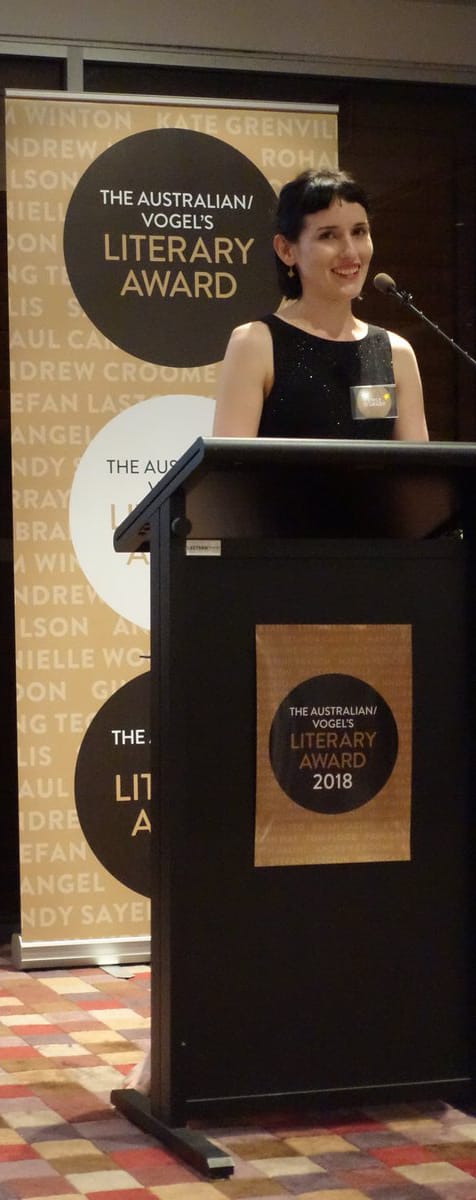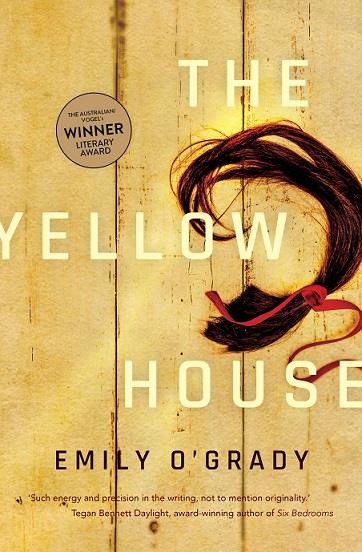
Emily O’Grady has won the 2018 Vogel Literary Award for her captivating first novel ‘The Yellow House’. Each year, the prize of $20,000 and a publishing contract with Allen & Unwin, is awarded to the best unpublished manuscript by an Australian writer under 35. O’Grady’s novel follows ten-year-old Cub and her brothers after she discovers that her deceased grandfather was a notorious serial killer. Stuck in the social and geographical outskirts of semi-rural Queensland, with her grandfather’s old weatherboard house just next door, Cub is forced to confront the profound and enduring influence that her grandfather’s actions have had on her life, family and community.
Congratulations on winning the Vogel Prize and writing a brilliant book. You’ve joined the ranks of past winners such as Tim Winton and Kate Grenville. What has winning the award meant for you?
The Vogel has launched the careers of so many brilliant Australian writers, so to be included on this list feels a little daunting, but as an emerging writer, it’s extremely validating. I’m really grateful that the judges recognised something in my manuscript. It’s always a lovely feeling to be acknowledged for something you have been chipping away at for a long time.
Your book explores some shocking and extreme aspects of human nature. How did you go about researching and engaging with these ideas? Where did you look for inspiration?
I didn’t have too look far for inspiration. While I was writing the book, there were a number of high profile murder cases that were just as extreme—if not more—than what I have fictionalised. What I wanted to interrogate is the ordinariness of these types of crimes—they are not committed by otherworldly monsters, but by unexceptional people in mundane circumstances. Abject and seemingly incomprehensible violence as a part of the everyday, rather than sensational or gratuitous. I also watched a lot of true crime documentaries, on Australian serial killers in particular, but I probably would have done that even if I weren’t writing the book.
The story is narrated by ten-year-old Cub, who doesn’t always understand the full extent of what is happening around her. Did you always want to narrate the story through innocent eyes, or did you need to experiment a bit before finding the right voice?
Cub’s voice remained fairly consistent throughout writing the book. She came to me pretty quickly, and her voice really dictated the mood of the book and direction of the narrative. I think her perspective is integral to how the story develops and how the reader makes sense of the family’s situation. She’s quite naive, and doesn’t have the life experience to fully comprehend what is happening around her, but at the same time, she is gutsy and her nosiness and desire to be included allows her to stitch together a piecemeal understanding of the legacy she has inherited, and of what lingers in the aftermath of violence.
You’ve mentioned in other interviews that you started writing the book around eight years ago, but decided to start from scratch in 2015. Did you find it difficult to work on a project for such a long period of time, or was it always easy to maintain your enthusiasm?
I don’t really have a problem with staying committed to the one idea, if I think I can follow through. I never got bored of writing the novel, and with each draft, new ideas would emerge and reveal narrative threads I hadn’t explored or considered. That said, there were times when I would put the manuscript away for long periods of time. Once I finished a draft, I wouldn’t touch it for months and months, but I would always be turning it over in my mind.
What’s the best writing advice you’ve ever received, and what advice would you give to writers who are just starting out?
Don’t be too precious with your words. Before I entered the Vogel, I’d written thousands and thousands of words that I eventually discarded over the course of redrafting, and I think ‘The Yellow House’ is stronger for it. I think it’s important to make sure the manuscript or story is as polished as it can be before sending it out.
What does your writing routine normally look like? What’s your process?
I don’t have a rigid writing routine. I can write anywhere, as long as it’s quiet. I’m quite a slow writer and don’t liked to be rushed to hit a word count or write for a certain number of hours a day. I appreciate having time and space to really dwell within a work, though that is a luxury that is harder and harder to come by.
You’ve had a fair bit of success for your previous fiction. You won the 2012 QUT Undergraduate Writing Prize, the 2013 QUT postgraduate prize, and have been published in a wide range of literary magazines, as well. Have you always wanted to be a writer? Was there a moment when you knew?
I was a voracious reader as a child, but didn’t start writing fiction until I was an adult. I studied writing at University with the intention of working in the editing and publishing industry, but it wasn’t until I started writing the odd short story here and there that I became drawn to the idea of writing long form fiction. I like dwelling deeply in one idea, and the expansiveness of a novel and its possibilities, I find really appealing.
Winners of the Vogel Prize find out that they’ve won months before it’s made public. What was it like keeping such big news a secret for such a long time?
I’m not a good secret keeper, so it was tricky. If the topic ever came up I would awkwardly change the subject. It was such a relief when the announcement was made, and I’m glad I’m not lying to anyone anymore.
Where do you hope to go from here? What’s your next project?
I’ve just started work on a new novel. It’s only a speck of an idea at the moment, but it feels invigorating to get stuck in to something entirely new.
Entries for The 2019 Vogel Prize are now open.
|
Emily O’Grady was born in 1991 in Brisbane. Her fiction and poetry have appeared in, or are forthcoming in ‘Review of Australian Fiction’, ‘Westerly’, ‘Australian Poetry Journal’, ‘The Lifted Brow’,’ Kill Your Darlings’, ‘The Big Issue Fiction Edition’ and ‘Award Winning Australian Writing’. In 2012 she won the QUT Undergraduate Writing Prize, and in 2013 she won the QUT Postgraduate Writing Prize. In 2017 she placed second in the Rachel Funari Prize for Fiction, was shortlisted for the Queensland Premiers Young Publishers and Writers Award, and was longlisted for the Elizabeth Jolley Prize for Fiction. She co-edits Stilts Journal, and is currently completing a PhD in Creative Writing at Queensland University of Technology, where she also works as a Sessional Academic. ‘The Yellow House’ is published by Allen & Unwin |
 |
